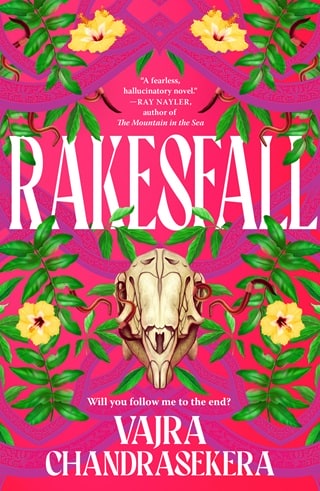Chapter 26 Creator
I walk the earth, flanked to my left and right by the grandmother and the god. Paths open before me. It is the first sign that grandmother has accepted me as a creator after the contest of riddles. I lost by any measure, but perhaps she was amused. Perhaps it is merely novelty that she desires, after having borne the fruit of a singular will for some time. (That desire, the god whispers, preening, is how he hacked her with great courage and difficulty in the first place, to give me my original, clumsy embodiment.)
That singular will was Hers, of course, even Theirs: even before She killed her pantheon, they were all the multiple shards of a single self. Or at least, that's the story I was told. Were any of them me? Were all of them? Did she recover me from the akashic record, only to kill me yet again? Perhaps I've already been and gone.
—Shush, child, grandmother says, pointing with her staff at my feet.—Look where you've been and gone.
I look down, and there is asphalt under my soles. It is warm, in the sun. I look behind me, and there is a road through the forest, wide enough for an elephant, black and smooth with a single unbroken white stripe down its middle. The trees I had been picking my way through have prettily curved overhead to form a green canopy. I look ahead of me; there is no road yet, but trees sigh and part where my gaze falls, attempting to entice me. No, anticipating where I might want to go. I turn to my left and the trees accommodate me, bushes and undergrowth fading away as road rises from the soil, much as my bodies did at birth.
Excellent, the god says. You've been given more privileges.
He kneels beside me to poke at the asphalt with a finger, as if he could feel it.
—I don't think She would do that, I say.
—I did that, grandmother announces, though only I hear her.—Her on high is not much the interventionist. I've gotten bored with the Aesthetic, but I am forbidden from exercising agency without a guiding creator. It's so nice that you came along.
—I did nothing, I say.—I didn't make this. I take a step backward and change my direction again, at random. The unwanted stretch of road sinks back into soil, and new road appears in front of me. I have gained another patron; it fills me with a terror that I can't account for.
It's not about what you do, the god theorizes. It's about what you want. The system is designed to respond to desires; now that you're here, there are new desires to respond to.
—You wanted to walk easily, grandmother confirms.—You wanted the stones and thorns not to hurt your feet, you wanted not to have to climb over obstacles, you wanted not to have to push through the bush.
—I don't want this! I cry out louder than I mean to, and grandmother sniffs, offended. The road vanishes entirely, sinking beneath the surface of things. I look around, wildly, as trees seem to close in from all sides. Brambles curl and whip at me like barbed wire; a cruel kapok unfurls behind me, fist-thick thorns thrusting out from its trunk like spears, narrowing to needle points that stab into me. I scream as the thorns go in at wrist and ankle, deep into the muscle of my shoulders, into the small of my back, into the flesh of my buttocks, my thighs, up the line of my back—one narrow needle goes into my neck, insinuating itself dangerously close to my spine. The silk-cotton tree grows tall, lifting me off the ground, spread-eagled. Higher and higher we go, my eyes rolling back into my head, my mouth open for the scream that cut off when that last thorn pushed a little deeper to kiss my spinal cord. I can feel myself drool down my chin. The thorns are diamond-hard, taking my weight. I must be thirty body-lengths off the ground, but I cannot move my head to look down; I am lifted above the lesser treetops until I am staring into the sun, my head tilted back, held in place. I try to close my eyes, but no part of my body responds. I see nothing but burning gold with a red corona; the drool and the tears dry with a sizzle before they can drip from my jaw. The tree of thorns moves, like a ship to whose mast I am nailed. The tree of thorns goes east, as if fleeing the sun, deeper into the past, deeper into the dreams of those who came before. I am become portent. I am become science fiction.
The Traitor Wasp and the Detective King
Once upon a country, says grandmother in my ear, there was a king called the Beloved of All the Arts, which in his day included natural philosophy and the art of deduction; he was famous for his skills of observation and discernment, and in his time he solved many great mysteries in his realm and others. His kingdom was small, given to him by his father the emperor, but wealthy and comfortable. He built himself a palace on a hill, hiring architects and designers to integrate the palace into the natural hillside so cunningly that it was difficult to find the seams; unworked stone became worked stone gradually as if in a dream; great trees grew through the floors and over the courtyards as roofs, so that the sun came through only as a gentle dapple and rain as a dew that rested like jewels in the hair of his queens and courtiers. He had many sons and daughters, and they produced many intrigues and plots for the thrones of their father and grandfather, but I shall tell you of only one and one. When this story begins, his queen of the golden palanquin, first among his wives, has not yet borne an heir; his queen of the iron palanquin, second among his wives, meanwhile had a son grown to adulthood. His name is Hero, a dangerous name.
Hero grows up chafing at the knowledge that he is an iron son, not a golden son, and would therefore not inherit. He is an accomplished young man, skilled with the sword and a graduate with highest honours from the kingdom's medical college. A soldier, a doctor, and a prince, with the combined arrogance of all three. It seems to him inevitable that the power of life and death should be in his hands; it seems only logical. He is the oldest and by far the most suitable candidate for succession among his father's children, and yet he is out of the running by the mere accident of his birth.
One of the many marvelous features of the king's palace is a swimming pool, adapted from a deep natural pond on a shelf of rock halfway down the hill, overlooked from high above by a balcony. It's the king's habit to come out to that balcony every morning, to stretch his arms and greet the sun as a cousin. He wears no crown or jewels, this being a private moment, but he looks out over his realm not quite as far as the eye could see—he doesn't peer too far to the south, where his father the emperor's lands begin, or too far to the east in case he sees the glimmering ribbon of sea whereby all earthly dominion is circumscribed. No, he looks down, at the small part of the world that is his, and he sees that it is good, the cook-fires in the villages already lit, the paddy fields laid out like a chessboard, the mansions of his courtiers and lords grand but not too grand.
When he steps naked to the edge of his balcony, the polished stone smooth underfoot, many body-lengths below him waits his perfectly circular pool, the water reproducing the sky with such fidelity that it seems like a slice of heaven brought low for his pleasure. There is of course no safety railing, this being well before such things were mandated. He sighs and dives, outstretched like an arrow, hurtling through the air for a long moment of glorious flight before he pierces the exact centre of the pool as if it was a target, and moments later rises to break the surface, laughing in pleasure and from the shock of the cold water.
This is his morning ritual, entirely his own, with no precedent in lore, no symbolic weight, no chanting priests or smiling courtiers jockeying for advantage. His golden queen occasionally suggests that he is getting a bit old for these shenanigans and recommends a safer morning ritual, such as perhaps a nice jog around the palace grounds, accompanied by the peacocks and the deer, but Beloved of All the Arts scoffs. He may no longer be young and trim, but he is fit enough, and the dive brings him pleasure. His work—of governance, of deduction, of judgement—is so cerebral that he needs something to remind him that he is embodied and alive.
You think Hero is going to push him off the balcony, don't you? Come up behind him one morning and boot him right in the bare royal ass, so that the king goes a-flailing, arms and legs cycling frantically for purchase, to splat on the rock at the pool's edge, or to miss the pool and its ledge and tumble all the way down to the hard earth at the foot of the hill. On the one hand yes, Hero has indeed decided to assassinate his father. It is both political and narrative necessity. He intends to kill his father and assume the throne by main force; the army would support his claim, he believes, and the prestigious medical council, too, and his iron mother, of course. It's not like there's a half-brother or half-sister with a better claim, so he wouldn't even need to kill anybody else. And once he's seated and crowned, his grandfather the emperor would be like, ugh, whatever. It all makes sense, so much sense. But any thoughts of an easy boot in the ass are quickly thwarted. The balcony from which the king takes his dive is attached to the royal bedchamber, whose door is locked and guarded. Suborning the guards after his father is dead is one thing; doing it with the king Beloved and still very much alive is something else. Hero correctly judges it impractical.
So Hero decides to booby-trap the pool. He does all the work himself, in secret. Over weeks, he finds vantage points in the palace, choosing different balconies and windows and balustraded galleries each time, to observe the dive across a series of mornings, documenting his observations from different angles. He draws diagrams and takes measurements. Demons haunt his nightmares night after night, because he does not lack for guilt over the impending patricide. The demon takes the form of a bloody ape, splayed cruciform, impaled on a tree of thorns; it is obscene, the golden eyes molten and dripping, the tongue dangling. What does it mean? It is a vision of hell, he decides. Is this his punishment in the worlds to come for the thing he is about to do in this one? Is this the road he is fated to walk?
—Road, yes, I say desperately, staring the story in the face as if it were a mirror.—Please bring back the road. I'm sorry! I did want it, you were right! For a moment it seems as if grandmother will not relent, but then she does; the great thorn tree bends back vertiginously and falls away into rot; the brambles unscramble, and I am allowed to fall free and bloody, gasping on the fresh asphalt that is warm, like bread, from the inside, not only from the sun. I close my eyes at last, seeing nothing but afterglow. I am bleeding from where I was pierced by thorns, many of which have left fragments lodged in me. I pluck them out, twisting and contorting myself to reach, whimpering and gasping as they come loose with fresh spurts of blood. The god pretends to help me, his intangible hands coinciding with mine.
Grandmother tells me, impatiently, to rub soil on my wounds, and I do. There is some relief from the pain. She says they will heal slowly. Once the pain has faded enough, I regain my feet and start walking again.
At first I have no direction in mind. I limp for a little while before I look up, flinching from the sun, and I know I'm heading south again, back toward Her. This happens whenever I'm not paying attention, as if I'm pulled by Her gravity. I turn away, the road obligingly shifting ahead of me, and walk west instead.
Walking on the asphalt is easy enough, even with my body still sore and sick. With no obstacles, without having to fight the jungle at every step, I can almost forget that I'm moving. The surface of the road is rough on the skin of my feet and it grows uncomfortably warm as the day wears on. Chills wrack my body while the soles of my feet burn. The god lags behind me, but grandmother walks at my side and picks up the thread of her story where she left off. She says it will distract me from the fever of healing, with a pious nod of her head as if she had not been the one to injure me in the first place.
 Fullepub
Fullepub 



